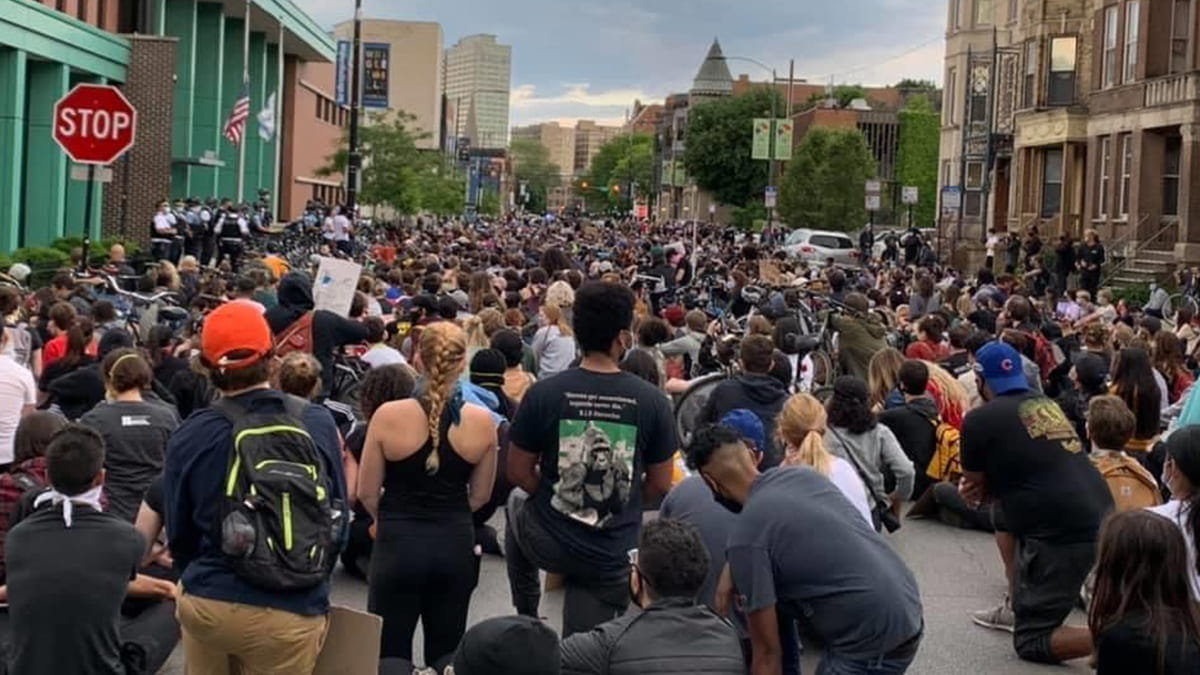Reclaiming Our Power: A Student Seeks Justice in an Unjust System

This post is the second post in a three-part series. Check out Jay Trewn’s first post on racism on the North Side of Chicago and his initial efforts to hold the CPD accountable.
By Jay Trewn (JD-MBA 2021)
Once it became clear that the system would not hold the offending officers accountable, my wife and I became dejected. In that sense, I suppose the system worked flawlessly. With the illusion of providing a fair and just process, it methodically broke us down until we gave up. But then came George Floyd, Breonna Taylor, Ahmaud Arbery, and countless other murders of Black folks at the hands of the people sworn to protect them. With them came loud calls to defund the police and demands for community control of the Chicago Police Department. Yet while the activists and organizers garnered an unbelievable amount of community support, they were met with systems and apparatuses desperate to retain power and to silence those demands.
Organizing for change
My wife and I knew we could not sit on the sidelines. Our safety depended on change, as did the safety of Black and Brown people across the city. So, we decided to organize in support of efforts to enact community control and true accountability of the police through a proposed ordinance called the Civilian Police Accountability Council. Among other things, CPAC would establish a democratically elected civilian council with the power to oversee the Chicago Police Department. First, we thought we’d start a simple email campaign to pressure our local alderman, Tom Tunney, to support the passage of CPAC. Yet, as we researched how our neighbors felt about CPAC, we learned that many of them had already been emailing, calling, and pleading with Tunney to support CPAC, to no avail. Naturally, we needed a louder message, and we could think of only one thing loud enough to reach him – a protest. And so, we set out to do something we had never done in our lives – organize a protest. With the help of our two neighbors Cassie and Dre Chattams, an interracial couple who previously had similar negative experiences with CPD, we set a date two weeks out and got to work.
We put together a small team of five – us four neighbors and Melanie Wells, a concerned resident of a neighboring Ward. We tapped into networks of marshals and medics to ensure the event was safe. We solicited donations for food, water, and medical supplies for distribution during the march.
Folks reached out to their personal networks to schedule speakers, including Alderman Carlos Ramirez Rosa, a tireless advocate for Black, Brown, and LGBTQIA+ communities who long has championed CPAC.
We organized bike and car escorts to ensure the police could not disrupt our demonstration. And most importantly, we got the word out through posting fliers, marketing on social media, chalking public sidewalks, and tapping into our personal networks. While we take some of the credit, the majority of the credit lies with our neighbors and community members, including the faith community and our local church, Lakeview Lutheran Church, who heard our stories, were fed up with the injustice, and decided to act.
Expanding a network of support
But the support was not limited to our immediate Lakeview neighbors. In a time when students were shut indoors and isolated from each other by a raging pandemic, my peers at the Northwestern School of Law and Kellogg School of Management nonetheless showed up in a major way. Northwestern JD-MBA students were first in line to market the event, posting fliers around Chicago, Rogers Park, and Evanston. The Black Management Association, Black Law Student Association, and other student groups reached out to their members to spread the word. Cyerra McGowan, then president of BLSA, and Chloe Edmonds, BLSA’s VP of academics at the time, both delivered powerful speeches at the demonstration, speaking to their experiences as Black women. Various law professors provided their personal contact information and assurances that if our first amendment rights were thwarted by the police, they would represent us. Professor Jim Speta, now interim dean of the law school, even attended in person, something I have yet to thank him for in person but will take the opportunity to do so now! While we all know that our institutions are flawed in many ways, and they must acknowledge those flaws and work radically to address them, the Northwestern law and business schools stepped up and showed up when I needed them most, and for that I remain grateful.
The impact
So, you are probably wondering how the event went? Well, an estimated 1,500 people showed up and lent their voices in support of my wife and I, my neighbors, and Black and Brown people across the City of Chicago. The demonstration was peaceful, the speakers were powerful, and the community support was resounding.
It was a powerful demonstration of what can happen when people reclaim their power and fight for justice and equity. In the weeks following the event, attendees emailed and called their alderpeople, demanding their support of CPAC. Community members continued to chalk on public sidewalks to increase awareness about CPAC and neighbors spread the word to family and friends.
And so, we thought our work was done. We had made a statement and galvanized the community in support of a necessary and just cause. Yet, it turned out this was merely the first chapter of the story, and our fight is only just beginning.
*Check back soon to hear about the ongoing fight, and what you can do to fight alongside us*

